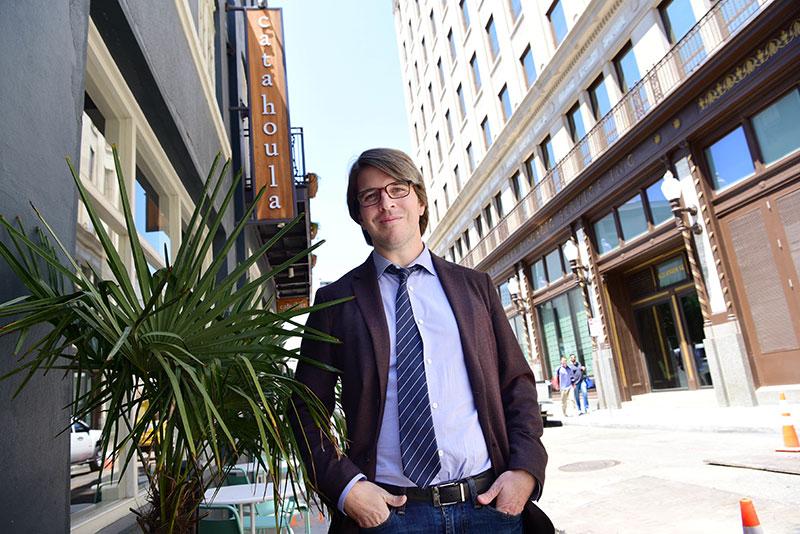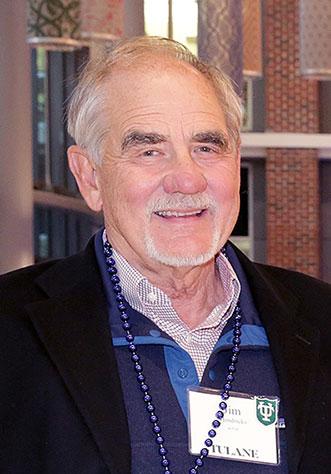New real estate programs give students real-world experience

When A. J. Brooks (MBA ’12) was hired to help develop the Freeman School’s new real estate programs, he knew immediately what kind of courses he wanted to build.
“At Freeman, we’re focused on action learning — taking students out of the classroom and into the industry,” says Brooks, lecturer in finance and assistant director of real estate at the Freeman School. “Some schools have elements of this type of learning, but we fully embrace it because it depicts the real world in all its complexity and leads to very powerful learning outcomes. I think this is where Freeman real estate education really differs from other schools.”
One of the action-learning courses Brooks introduced is a hospitality real estate development class that partnered with award-winning boutique hotel company Graduate Hotels last year. Students in the course were able to take on the role of real estate entrepreneur by running a feasibility study and pitching a new hotel development project to members from Graduate Hotels’ management team.
Another course Brooks teaches, Cases in Real Estate, again puts students in the role of prospective real estate developers.
“Every year our students end up going out and doing exactly what an entrepreneurial developer would do – identifying a piece of land and writing a full business proposal for the development of that land, which they end up presenting at the end of the semester to an investment panel filled with industry experts,” Brooks says.
Brooks earned his MBA from Freeman in 2012 and worked as a developer for roughly seven years before returning to Tulane to teach full-time. Among his many projects, Brooks developed what is now the Selina Catahoula New Orleans, a boutique hotel property that opened in downtown New Orleans in 2016.
Launched in 2019, the Freeman School’s Real Estate programs include a specialization in real estate for Master of Management students, a concentration in real estate for MBA students and a first-of-its-kind double-degree program in which students earn both an MBA from the Freeman School and a Master of Sustainable Real Estate Development from Tulane’s School of Architecture.
In addition to the partnership with Graduate Hotels, students in the first year of the programs competed in the National Real Estate Challenge, an invitation-only case competition hosted by the University of Texas at Austin, and reenergized the Tulane Real Estate Club — which Brooks founded when he was an MBA student.
Inspired by the Real Estate programs’ potential, alumnus James C. “Jim” Hendricks (MBA ’74) established the James C. Hendricks Real Estate Fund at the Freeman School to help ensure that students seeking careers in real estate will have the educational tools to thrive. Hendricks, retired managing director at Clarion Partners and CEO of Lion Industrial Trust, believes Tulane is an ideal place to study real estate and hopes that his support will further develop Real Estate education at the Freeman School.

“When I attended Tulane in pursuit of my MBA, the business school was much smaller and didn’t have the variety of offerings it now does. Fortunately, I became associated with the Trammell Crow organization and remained so for over 20 years,” Hendricks says. “Today, I’m honored to be able to play a part in bolstering these exciting new real estate programs at the Freeman School of Business.”
New Orleans is an exceptional place to study real estate, Brooks says, due to the abundance of both historic buildings and government tax incentives available to developers seeking to restore those buildings.
“There are a lot of deals that are doable in New Orleans because of its historic nature that may not otherwise be doable in other cities,” he says. “Although historic rehabs can often be more complex than traditional deals, it can make for a really exciting, dynamic, and unique environment.”
After Hurricane Katrina, there was an explosion of real estate development in New Orleans that resulted in the current vibrant downtown skyline. “It’s such an exciting time to be in the city, with all the development that’s happening,” says Brooks. Though the COVID-19 pandemic makes the future of the commercial real estate industry more uncertain, Brooks says it’s a thrilling time to be involved in real estate, and he’s confident in the future of New Orleans. “It's a resilient city.”
Hendricks hopes other Tulane alumni in the real estate industry will join him in supporting the Freeman School’s real estate programming. “I know there are a lot of alumni in the industry and supporting this new real estate program is a wonderful way to support talented future real estate leaders,” he says.
Looking to the future, Brooks has a number of exciting plans for the Real Estate programs, including building a class around a real estate fund that invests actual money in deals. Similar to Freeman’s Darwin Fenner Student Management Fund, Brooks said students would truly benefit from this real-world experience: “I would love to give students the ability to participate in underwriting actual deals. When the stakes go beyond the hypothetical, that is where the true education and preparation for a career in real estate begins.”
Interested in advancing your education and/or career? Learn more about Freeman’s MBA programs. Find the right program for you.
Other Related Articles
- Students network their way through Manhattan in annual Real Estate Trek
- Snapping Back: Alumna is HP’s guardian against disruption
- Harvard Business Review: Why AI Boosts Creativity for Some Employees but Not Others
- Forbes: How To Talk Politics With Family Over The Holiday
- AI-powered fund takes top prize in Aaron Selber Jr. Hedge Fund Course
- De Franco appointed Keehn Berry Chair of Banking and Finance
- The Wall Street Journal: For Trump, the Warner Megadeal Talks Are All About CNN
- Research Notes: Matthew Higgins
